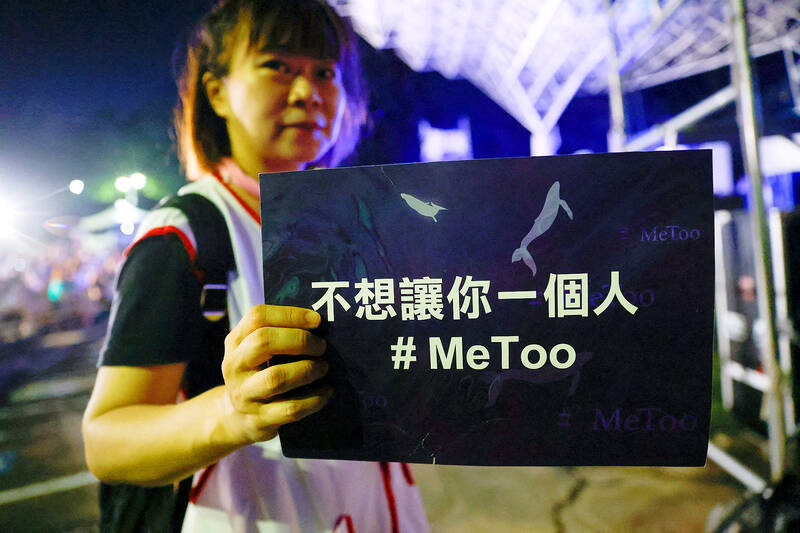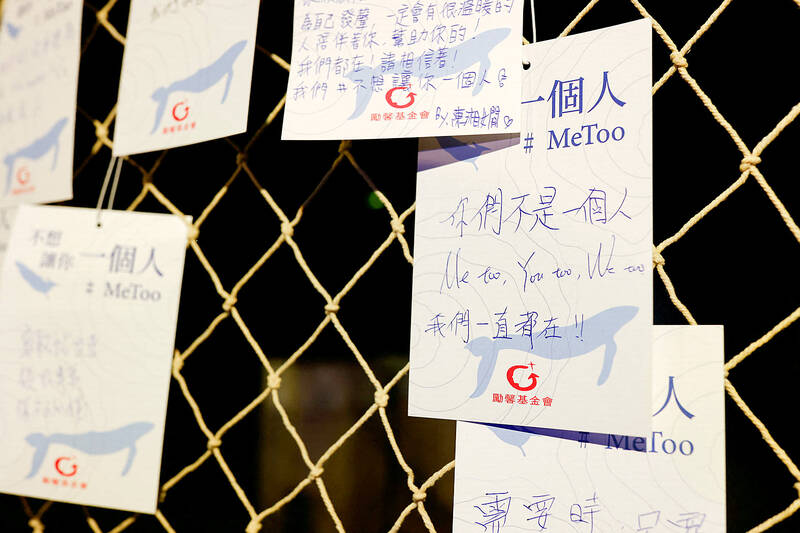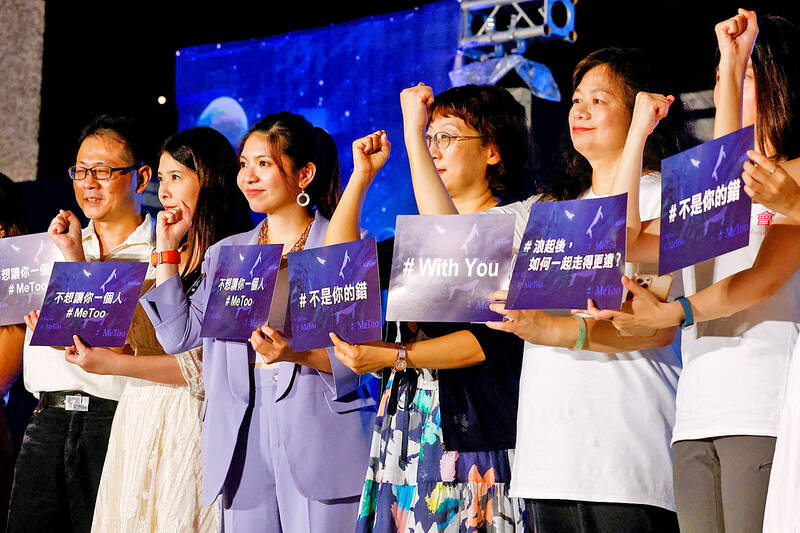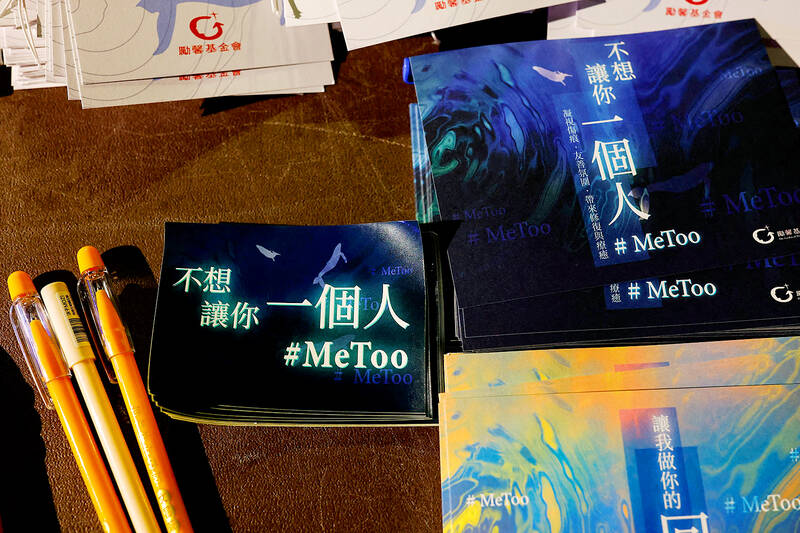When Judy saw the wave of MeToo accusations filling her newsfeeds, her first thought was “finally.” She had long hoped that Taiwan would join the pushback against sexual harassment and abuse that first exploded overseas half a decade ago.
“Me and lots of my friends have faced sexual harassment, and even worse situations before,” Judy says, who requested anonymity. “Finally we started to have some focus on this topic.”
She lists the questions she’s fielded since coming forward: What were you wearing? Why didn’t you object? But is your boss handsome?

Photo: Reuters
“I’m already vulnerable and sad and hurt, and I have to answer your questions,” she says.
The young Taipei resident says she was repeatedly sexually harassed by the owner of the company she used to work at, including him groping her under the table at an overseas business dinner.
“I felt so vulnerable at the moment. Before it happened I thought I could totally stand up for myself, but when it happened I couldn’t,” she says.

Photo: Reuters
When she got home she quit, but didn’t make a complaint or tell her parents. Her mother had warned her as a teenager to expect workplace harassment, but she “should just smile and ignore it and try to get away from it.”
Then in late May, a former staffer in the ruling Democratic Progressive party (DPP) named Chen Chien-jou (陳汘瑈) accused a film director working with the party of having groped and harassed her in 2018, and the head of the party’s women’s affairs department of having dismissed her claims.
Chen’s post went viral overnight, prompting hundreds of other complaints and started a national reckoning over harassment in Taiwan, though activists say generational divides and entrenched social expectations still threaten to hold it back.

Photo: Reuters
‘LET’S NOT JUST LET THIS GO’
Perhaps motivated by a forthcoming election, Chen’s post prompted two separate apologies from President Tsai Ing-wen (蔡英文), an internal investigation which found Chen’s complaint was mishandled, and several party resignations, which appears to have encouraged other victims to come forward, prompting more investigations and resignations in the DPP and in other parties.
Chen has said she was inspired to share her allegations by Wave Makers, a Taiwanese Netflix series following the fictional campaign team of a presidential election, with a core plot line centering on sexual harassment. Her post quoted one character telling a victim: “Let’s not just let this go.” It has become a rallying cry in Taiwan.

Photo: Reuters
“I knew that if this first story could be handled well, then more people will find the courage to come forward as well with their stories,” Chen later told the China Project. So the first case really is the key if the hope is for there to be a movement.”
More than 150 others — mostly women but also some men — have since come forward with allegations against high-profile political figures, celebrities, academics and lauded pro-democracy activists. The fallout has been messy, with denials, counteraccusations and defamation suits against accusers. But there has been real change.
Taiwan criminalized sexual harassment only in 2009. Last week Taiwan’s parliament amended the three relevant laws (separately governing workplaces, schools and elsewhere), to introduce harsher penalties, lengthen reporting periods and close loopholes. The workplace law was also amended to define “sexual harassment with an abuse of power.”
The amendments were welcomed, but observers worry they don’t go far enough to address abuse and harassment in religious organizations and cram schools, and warn Taiwan also needs cultural change.
“The amendments will not mark the end of the improvement of laws and policies but a starting point, we hope,” says Kang Ting-yu, from National Chengchi University’s journalism department.
“Laws are not the only way that shapes people’s behaviors,” Kang says.
Despite its progressive reputation “Taiwan, like most other countries, is still influenced by patriarchal norms and misogyny
“Online misogyny has been on the rise in Taiwan over the past decade, with news articles on sexual harassment or rape often attracting sarcastic comments and victim-blaming.”
REFUSING TO STAY QUIET
Government surveys this year revealed almost 80 percent of women who say they’ve been harassed in the workplace choose not to report it. Sexual harassment has been accepted quietly for so long that it has its own colloquial term. It is referred to as chidoufu (吃豆腐) or “eating tofu,” because of a historical association with women being the primary sellers of tofu, and frequently subject to harassment by male customers.
Wang Yueh-hao (王玥好), the chief executive of the Garden of Hope Foundation which helps victims of gender-based violence, says this is because of distrust in the justice system, but Taiwan also has strong traditional expectations that people defer to elders and those in senior positions.
Last week Taiwanese writer and comedian, Vickie Wang, said this was being exploited, declaring in a widely shared opinion piece that “Women in Taiwan Are Tired of Being Nice.”
“In spite of all of Taiwan’s progress, our society remains patriarchal and hierarchical,” Wang wrote for the New York Times. “People are expected to respect and yield to their elders and superiors — in short, the powers that be.”
LEARNING FROM THE WRONG PLACES
Taiwanese journalist Fang Hui-chen says the movement and the government’s response are a “wake-up call” to older men who “weren’t taught to respect boundaries.”
Fang posted her own MeToo allegations in June, against a high-profile media executive, who has denied the claims. Overwhelmed and isolated by the media coverage of herself, Fang began collecting and publishing other MeToo stories. Women began asking her directly to post their stories — ranging from mild harassment to accusations of rape — anonymously.
“They were afraid of the men who did that to them,” she says. “These guys have absolute power over your career. But one of the slogans of Taiwan’s MeToo movement is ‘I don’t want you to be alone,’ so they shared their stories.”
On a Saturday night in Taipei’s Daan park, celebrities and activists gathered for a MeToo rally and concert. Attendees wrote messages on cards, tying them to a wire fence. Several carry variations of “I don’t want you to be alone.”
A group of Taiwanese friends in their 20s tell the Guardian they’re supportive of the movement but aren’t optimistic about changes to come. Wave Makers was realistic about Taiwanese society, they say — until it depicted actual consequences for the perpetrators.
As well as social expectations like chidoufu and generational differences between today’s youth and older people who grew up during four decades of martial law, the group also say that inadequate sex and consent education for their own age group has contributed to the problem.
“We learn a lot of things from the wrong places,” says Liao Chia-Mei, citing mainstream and adult films. “I think some people just really don’t know how to act the right way.”
They later discuss “how people in other countries figure out boundaries,” and if it should be schools or parents teaching. “Can we take the lessons from them and help the movement?”
Garden Of Hope’s Wang is cautiously optimistic, and hopes the people of Taiwan will “not just let this go.”
The organization has seen a 20-fold increase in calls for assistance since May.
“In the past they [victims] tended to believe they were alone in these situations, they didn’t know until now there were so many victims like them,” she says. “This movement has changed the values of Taiwanese people.”

Climate change, political headwinds and diverging market dynamics around the world have pushed coffee prices to fresh records, jacking up the cost of your everyday brew or a barista’s signature macchiato. While the current hot streak may calm down in the coming months, experts and industry insiders expect volatility will remain the watchword, giving little visibility for producers — two-thirds of whom farm parcels of less than one hectare. METEORIC RISE The price of arabica beans listed in New York surged by 90 percent last year, smashing on Dec. 10 a record dating from 1977 — US$3.48 per pound. Robusta prices have

A few years ago, getting a visa to visit China was a “ball ache,” says Kate Murray. The Australian was going for a four-day trade show, but the visa required a formal invitation from the organizers and what felt like “a thousand forms.” “They wanted so many details about your life and personal life,” she tells the Guardian. “The paperwork was bonkers.” But were she to go back again now, Murray could just jump on the plane. Australians are among citizens of almost 40 countries for which China now waives visas for business, tourism or family visits for up to four weeks. It’s

The resignation of Taiwan People’s Party (TPP) co-founder Ko Wen-je (柯文哲) as party chair on Jan. 1 has led to an interesting battle between two leading party figures, Huang Kuo-chang (黃國昌) and Tsai Pi-ru (蔡壁如). For years the party has been a one-man show, but with Ko being held incommunicado while on trial for corruption, the new chair’s leadership could be make or break for the young party. Not only are the two very different in style, their backgrounds are very different. Tsai is a co-founder of the TPP and has been with Ko from the very beginning. Huang has

Beyonce on Sunday finally won the Grammy for the year’s best album for her culture-shaking Cowboy Carter, as rapper Kendrick Lamar posted a clean sweep on a night that served as a love letter to fire-ravaged Los Angeles. Chappell Roan, Charli XCX, Doechii and Sabrina Carpenter emerged as big winners at the performance-heavy gala, while heavyweights Taylor Swift and Billie Eilish went home empty-handed. Beyonce’s win for Cowboy Carter now makes her the most nominated, most decorated artist at the awards show ever — as well as the first Black woman to claim the top prize in this century. The triumph was all